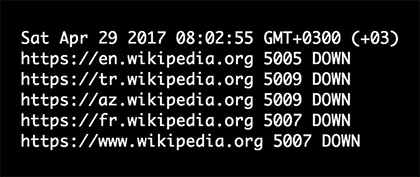Wikipedia is invulnerable to censoring the IPFS network
 August 24, 2015 Roskomnadzor ordered to block Wikipedia in Russia . Soon, the officials thought better of it and reversed the decision. But this may happen at any time.
August 24, 2015 Roskomnadzor ordered to block Wikipedia in Russia . Soon, the officials thought better of it and reversed the decision. But this may happen at any time.On March 29, 2017, the Turkish authorities followed the example of the Russian brothers in mind. They also blocked Wikipedia . The Turks went to the end - and from 8:00 local time all versions of Wikipedia were blocked in Turkey in accordance with administrative decision No. 490.05.01.2017-182198 / 5651.
As John Perry Barlow said at the time, the Internet, by its very nature, perceives censorship as a malfunction and tries to circumvent it. There are many standard ways to circumvent the usual IP blocking. Two years ago, the Network spawned a conceptually new IPFS project (Inter-Planetary File System), which makes censoring specific IP addresses on the Internet impossible in principle. Here, instead of addressing by location, addressing by content is used . There is no single center in the peer-to-peer network that can be blocked. Copies spread from node to node. Even if you destroy all copies of the content, except for one, the information will again go through the network.
')
IPFS is a technology that works now, and it is fully prepared to help out in a situation when Roskomnadzor officials block content, trying to prevent citizens from receiving any information. The example of Turkey perfectly demonstrates this.
On May 3, 2017, IPFS Team activists decided to move Turkish Wikipedia to the IPFS peering network . Residents of the country again received free access to the content.
So far, tr.wikipedia.org (10 GB) has been transferred to the peers network, and soon they plan to add Arabic, Kurdish and English versions. The IPFS maintainers did this on their own initiative, without coordination with the Wikimedia Foundation or with Wikipedia editors. Actually, such an agreement is not required. The goal of the IPFS project is to counter any type of censorship, improving free access to information for citizens around the world. Activists of this project categorically oppose the censorship of history, news, free thoughts, and all the more such a repository of valuable information such as Wikipedia. Free access to any information is a vital necessity for a modern person, a free society and a prosperous culture. Therefore, they began work on a project to transfer the Turkish Wikipedia as soon as they heard the news about its blocking. No doubt, the same will be done immediately after the blocking of Wikipedia in Russia.
About the "interplanetary file system" IPFS has already been told on Habré. Dear ivan386 published instructions on site hosting . So readers are familiar with the principles of addressing content through a multi-cache in a distributed P2P network. You can refresh your knowledge in this part of the video lecture or in this excellent article .

Advantages of IPFS : Content on an IPFS network is more difficult to attack, it is cryptographically verified (and protected from tampering), if you block one gate, you can use any other, IPFS does not need the DNS system, it supports Tor, IPFS sites do not rely on certification centers and therefore, there is no threat of certificate falsification - the content is confirmed cryptographically, just like the blockchain. Content between nodes can be transferred on any media (for example, on a flash drive) by flopping type.
The full static snapshot https://tr.wikipedia.org was taken on April 30, 2017. It is available by the following unique identifier (cryptographic hash):
/ipfs/QmT5NvUtoM5nWFfrQdVrFtvGfKFmG7AHE8P34isapyhCxX/wiki/Anasayfa.html
This link leads to a specific snapshot of April 30 and will always lead to it, because the hash is derived from the content itself.
To see the latest copy of the content https://tr.wikipedia.org , you need to use the IPNS link:
/ipns/QmVH1VzGBydSfmNG7rmdDjAeBZ71UVeEahVbNpFQtwZK8W/wiki/Anasayfa.html
Turkish Wikipedia is only the first swallow. In the future, it is planned to make copies of the entire Wikipedia in IPFS. At the first stage, these will be periodic snapshots of content without editing. For example, content can be updated once a week. And the long-term goal is to develop technologies for full-fledged editable Wikipedia over IPFS. Of course, to create such a version would require close cooperation with Wikipedia.org.
At its core, IPFS is very similar to the blockchain, and it is not surprising that many applications on the blockchain use IPFS, embedding static multiheshes with IPFS addresses in a transaction. Interestingly, the IPFS developers even plan to release their Filecoin cryptocurrency . For its mining, you need not to cheat blocks, but provide hosting sites in IPFS.
Source: https://habr.com/ru/post/373439/
All Articles